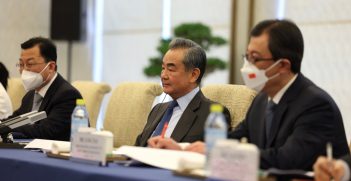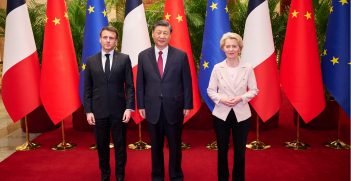Book Review: The Dragon Roars Back

“The Dragon Roars Back” is a deep-dive into the leadership and foreign policy of the People’s Republic of China. With a focus on transformative leadership, Suisheng Zhao explores how the leaders of each generation moulded China and its treatment of the wider world.
Suisheng Zhao has written an interesting and thought-provoking book on Chinese foreign policy. Contrary to many other approaches to this topic, Zhao focuses on the five generations of PRC leadership (Mao Zedong, Deng Xiaoping, Jiang Zemin, Hu Jintao and Xi Jinping) with a particular focus on the “transformational” leaders: Mao, Deng, and Xi. He argues that these transformational leader’s policies are better explained by a “Leadership-Centred Framework,” because leaders matter more in authoritarian political systems with a lack of institutional and public constraints. However, Zhao is less interested in the personal predilections and history, ideology, cognition, perception, and image of the outside world that individual leaders may possess. Instead, he focuses on how these leaders operate in, and reshaped, the larger domestic and international political, institutional, and ideational environments.
Zhao then provides a thoughtful description of each transformational leader’s foreign policy. He argues that Mao’s “revolutionary diplomacy” astutely adjusted the foreign policy to reflect the insecurity and weakness of the Chinese state in the first two decades of PRC rule. Mao pragmatically embraced non-interference with domestic affairs, sovereign equality, and anti-colonialism in concert with other newly independent developing states as a rhetorical mechanism to prevent encroachments on PRC security. For Mao, material and ideological threats to Chinese sovereignty and the regime were both international and external, and his policy pragmatically sought to capitalise on the PRC’s ideological and revolutionary credentials while reaffirming its historical geo-political importance in the Asia-Pacific.
By contrast, Deng believed the major threats to PRC were poverty, continuous domestic ideological contention, and continued international polarisation. The country needed to cultivate a benign international environment which would allow it to develop. Deng’s “Developmental Diplomacy” used the strategic leverage between the two superpowers to create space for economic growth and sought to deepen ties with Europe and other states with various multilateral initiatives. After the end of the Cold War and the outrage that followed the bloody crushing of the Tiananmen Square protests, Deng (and Jiang Zemin after him) sought to deal with China’s geostrategic isolation by compromising and avoiding escalation over various incidents, such as the bombings of the Chinese Embassy in Belgrade. The human rights concerns of western states over Tiananmen were gradually dispensed; a process that was punctuated by the 2001 World Trade Center bombing, the “War on Terror,” and China’s admission to the World Trade Organisation. Walking and talking softly had benefits. The current President Xi, Zhao notes, had enough with such notions. Envisioning a time of profound global change in which the West was in decline and China was on the rise, Xi has embarked on what Zhao calls “Big Power” Diplomacy. This diplomacy is characterised by a willingness to use China’s material economic and military capabilities as well as aggressive diplomacy to replace the United States secure and China’s “rightful” place as the pre-eminent great power.
Zhao’s discussion of Chinese nationalism and historical narratives is particularly insightful. Both nationalist and historical narratives presume on underlying benign and non-violent historical presence and historiography for Imperial China (and by extension the PRC today) that emphasises China’s “peaceful intention” using the concept of tianxia (天下). It emphases the idea that “China possessed a unique strategic culture disinclined to force and coercion” which inclines it to seek non-violent solutions to interstate disputes and favour “peace over expansion and ward.” Ironically these historical and present narratives, and the national “imagined community,” has been cultivated through the use of nationalist tropes, stories, and brazen misrepresentations of other states. These devices are aimed at building the regime’s legitimacy and support for its foreign policy. However, their use has exacerbated an aggressive form of nationalism which invests in a victimhood narrative based on the 19th “century of humiliation.” This state-led popular nationalism has instilled the “mentality that any criticism of China by foreign countries is instigated by anti-China ’black hands,’” in turn sparking “populist nationalist demands for the government to fight back on any unwarranted foreign criticism and actions.” Perhaps more concerning is that this narrative and non-reflective nationalism has been tied, in Zhao’s words, to an “inflated sense of empowerment,” that in turn has justifies aggressive action and wolf warrior diplomacy in the face of the perceived decline of the West.
Nevertheless, the aim of positioning “China in the commanding heights of international competition” backed by nationalism and a sense of a declining West has been less than successful. While China has enjoyed dizzying economic success, Zhao argues that it has become a “revisionist stakeholder” in the international order, and this has caused other states to view its actions and policies as increasingly suspect. Despite success in extending influence over the South China Sea, its aggressive disregard for the interests and sensibilities of its neighbours and interested Western states has led to distrust and alignment away from China. States have raised tariffs, denied technology transfers and investments, and increased security cooperation in an effort to balance and counteract Chinese power.
In a sense, current Chinese foreign policy under Xi has created the conditions of encirclement and containment that Mao recognised as a problem in the first decades of the PRC. And sadly, the recrudescence of loyalty as a measure of policy competence, a defining (and damaging) aspect of Mao’s governance process, has again become the “critical measure of officials” performance assessment. For Zhao, this is the problem with Chinese policy under President Xi today. From his perspective, China lacks the economic, military, demographic, normative, and soft power heft to aggressively pursue a coercive and uncompromising foreign policy vis-à-vis its neighbours and the United States. At the same time, the declining United States, challenged by international and external tensions, is unable to pursue a coherent foreign policy. The result is that the “world is in danger of moving toward the jungle of anarchy” where every state is for itself.
The rather dismal picture Zhao paints is a good reminder that foreign policy and foreign policy analysis is central to global and national well-being. Yet, Zhao’s leadership-centred analysis focuses a bit too much on the external environment and does not query the individual personalities and predilections of the particular leaders. While one can argue, as Zhao does, that Mao has a “realist” acceptance of China’s weakness and the potential for encirclement, it is hard to square with his continuing revolutionary diplomacy and rhetoric (or the Cultural Revolution’s chaos for that matter). This suggests a more nuanced, more non-systematic conception of international and domestic politics based on individual characteristics which Zhao does not fully explore. Similarly, Zhao does not query why Xi views the 2008 Great Financial Crisis as a defining, fundamental change in the international order and the commencement of the inexorable decline of the West. Moreover, it is unclear whether, say, a more moderate approach to power pursued under Hu Jintao, or a more aggressive foreign policy under Xi, may be due to personal characteristics. The Leadership Model needs to consider whether Xi’s personal characteristics are a reason why he has been so determined to accumulate power and purchase loyalty in foreign policy. It would have been interesting to have Zhao investigate these more individualist and particular aspects in his study. He does rightly argue that in authoritarian systems the leader is less constrained. As such, Zhao’s book does not quite live up to this ambition. While a useful and insightful read, the author is more realist in the approach than his theoretical framework provides.
This is a review of Suisheng Zhao’s The Dragon Roars Back: Transformational Leaders and Dynamics of Chinese Foreign Policy. (Redwood City, California: Stanford University Press, 2022). ISBN: 9781503634145
Dr Xiang Gao is a Senior Lecturer and the Discipline Convenor of Political and International Studies at the University of New England.
This review is published under a Creative Commons License and may be republished with attribution.





